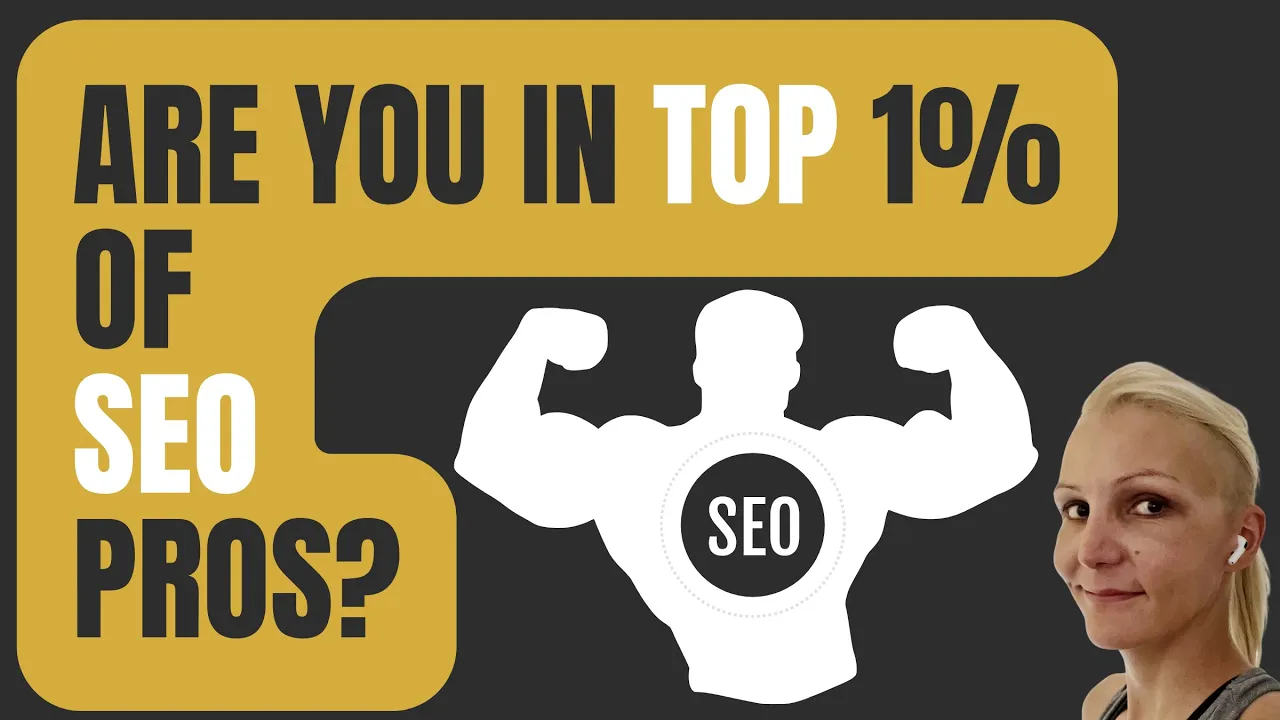
Updated: February 17, 2024.
I’m Olga Zarr, with a decade of SEO experience under my belt. This guide is my no-nonsense approach to becoming an SEO expert. It’s distilled from years of trial, error, and success.
I’m cutting through the clutter to give you the straight path I wish I had when I started. We’ll cover foundational steps, practical insights, and the mindset you need.
Ready to get serious about SEO? Let’s get to work.
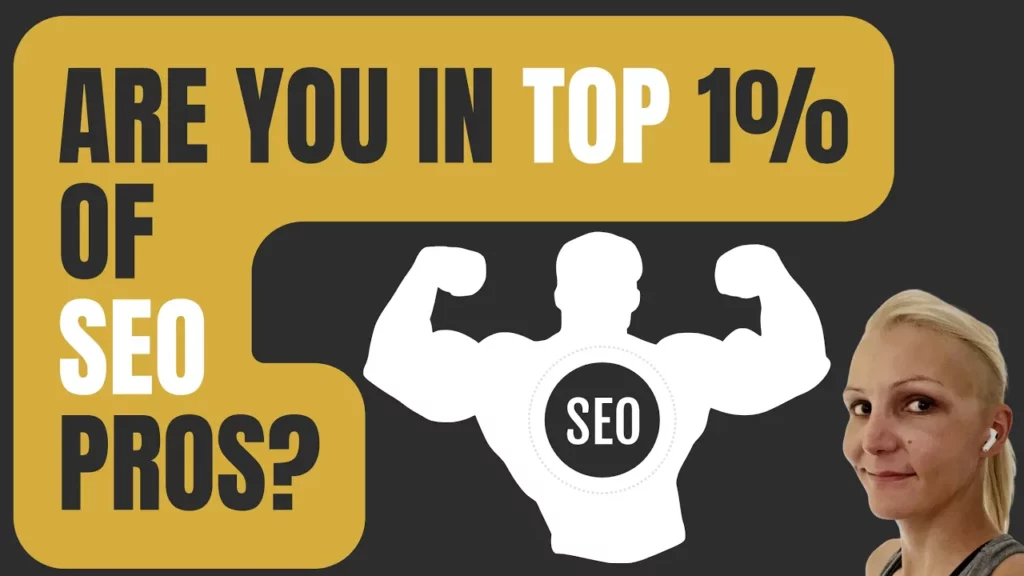
How to become an SEO expert (video)
Here is the video I’ve recorded for you that discussed exactly how to become an SEO expert in 31 steps.
How to become an SEO expert (31 ways)
Here are the steps to become an SEO expert based on real experience. No fluff, just what truly works.
“If you do all of them, then you will be in the top 1 percent of SEOs who are really moving the needle, who are really like taking the lead, who are thought leaders in SEO industry.”
Olga Zarr, SEO Consultant
Cora Pro SEO Software 25% OFF
Cora SEO Software has been an absolute game-changer for me. This tool measures thousands of factors and tells you exactly which ones appear to influence rankings and how much you need of each to compete with higher ranking competitors.
You don’t need to believe what I’m saying. Just try for yourself! I have a special lifetime deal 25% OFF (and free unlimited training) for my visitors.
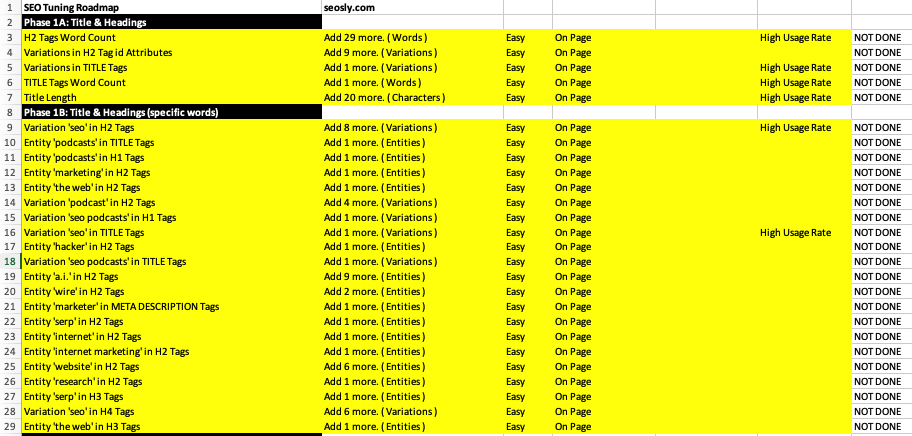
Let’s dive in.
SEO Expert Tip #1: SEO Fundamentals
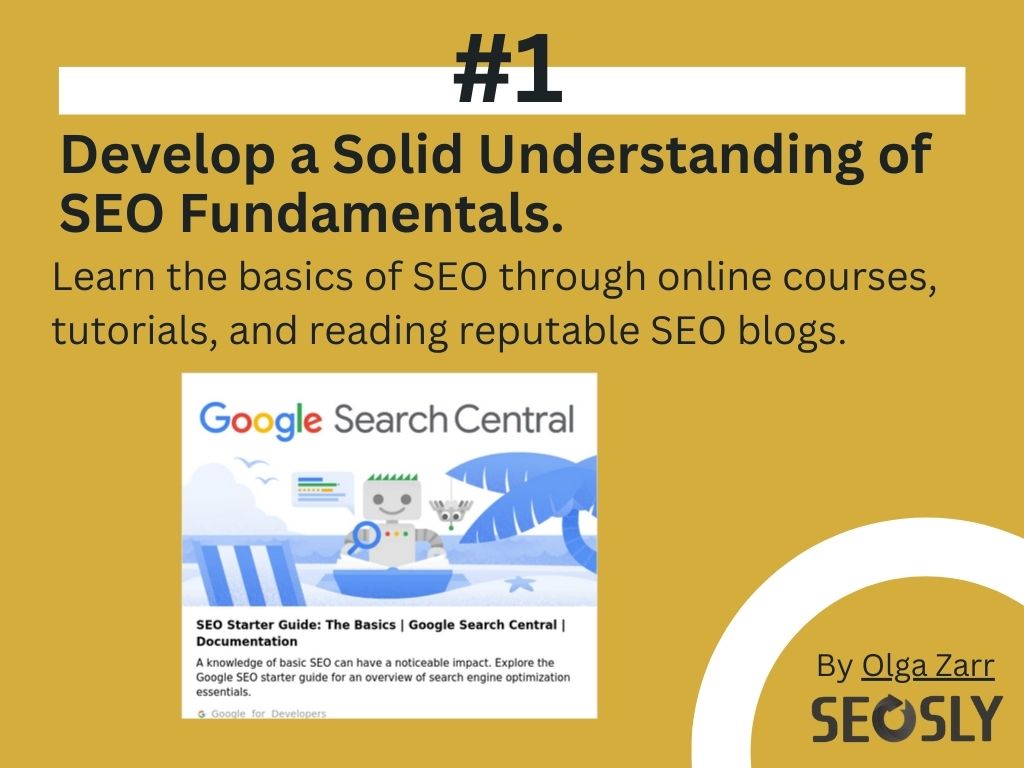
Learn deeply about core search engine capabilities like crawling, indexing, ranking algorithms. Understand technical on-page factors, off-page signals, and how they impact visibility and rankings. Start with Google’s comprehensive SEO Starter Guide and use other resources to fill knowledge gaps.
SEO Expert Tip #2: Create Your Own Site
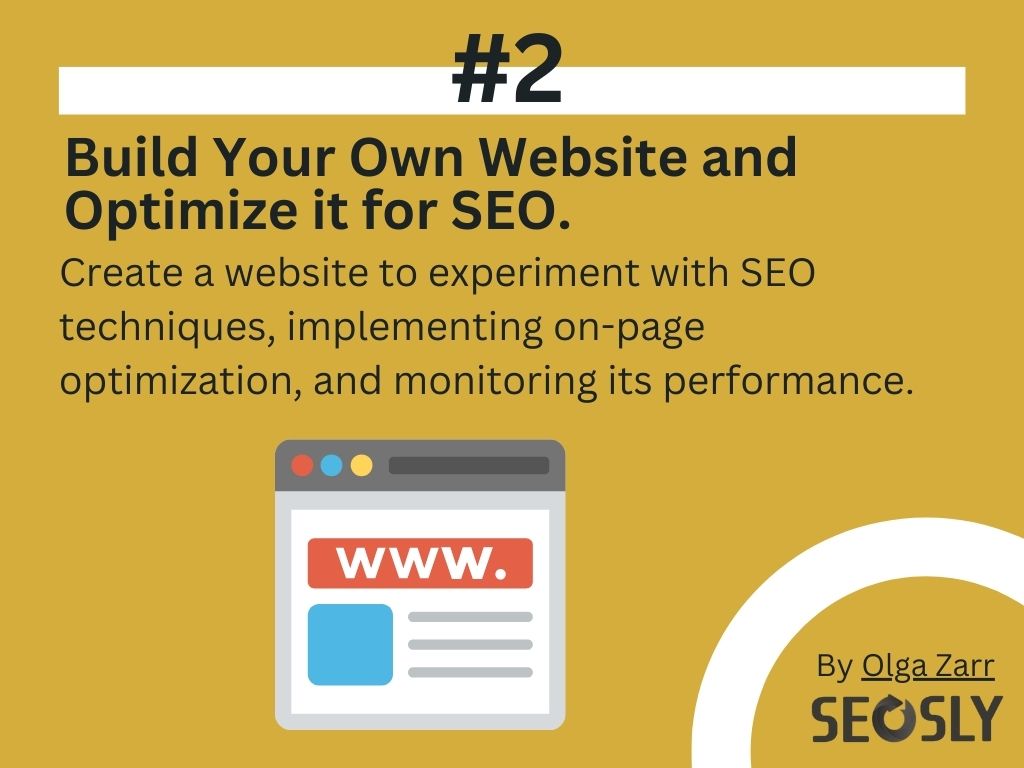
Build your own websites end-to-end, from researching topics, planning site architecture, creating content, implementing on-page optimizations, building links, tracking organic performance over time. Experiment extensively to determine what works for ranking, traffic growth and conversions. This hands-on experience is invaluable.
SEO Expert Tip #3: Master Keyword Research
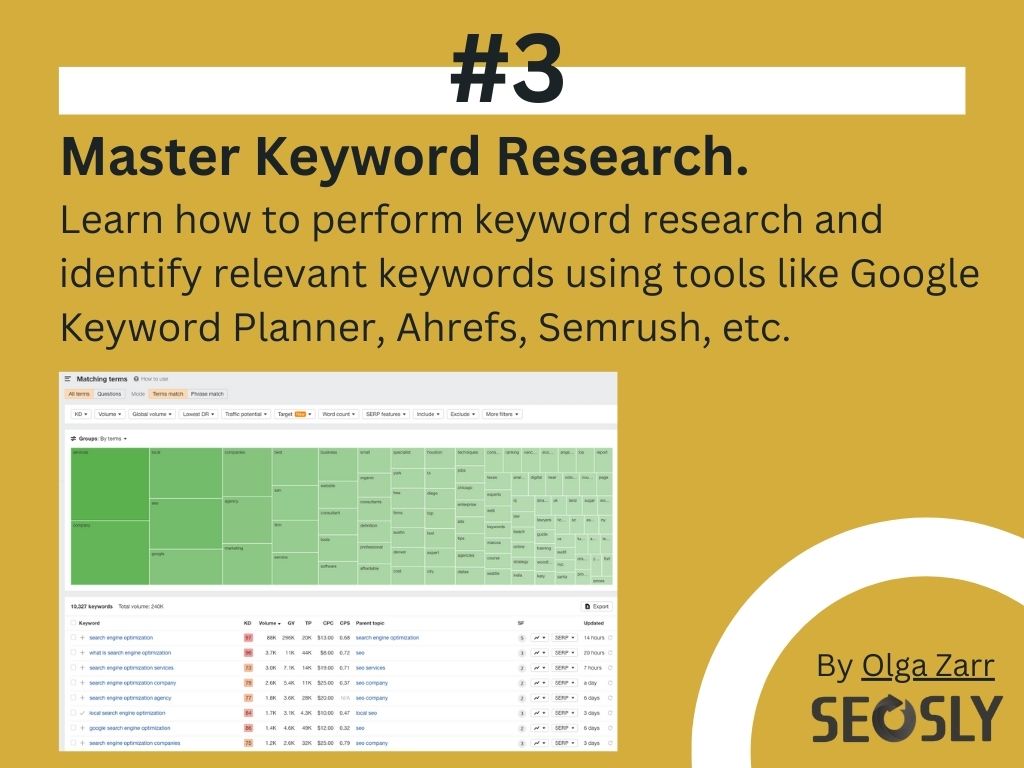
Develop expertise with keyword research tools like Google Keyword Planner, Semrush, Ahrefs, Moz and UberSuggest. Learn techniques to identify valuable long-tail keywords aligned to searcher intent. Analyze keyword difficulty, search volume, seasonality trends and competition levels to create targeted lists. Stay on top of changes in Google’s keyword tracking.
SEO Expert Tip #4: On-page SEO
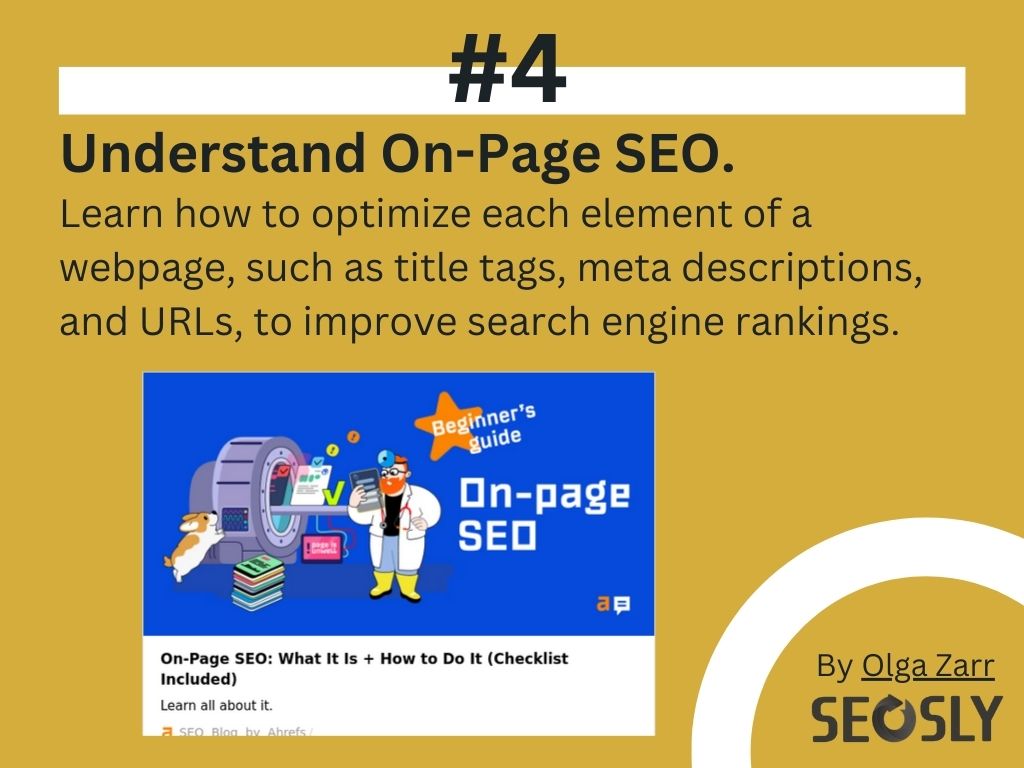
On-page optimization entails ensuring pages target primary and secondary keywords through positioning them in titles, headers, content, image names and alt text. Structure content to match user intent while optimizing for rank brain comprehension. Use LSI keywords and synonyms. Ensure site architecture facilitates crawlability. On-page excellence drives higher rankings. The Cora SEO tool is the absolute must for on-page SEO.
SEO Expert Tip #5: Technical SEO
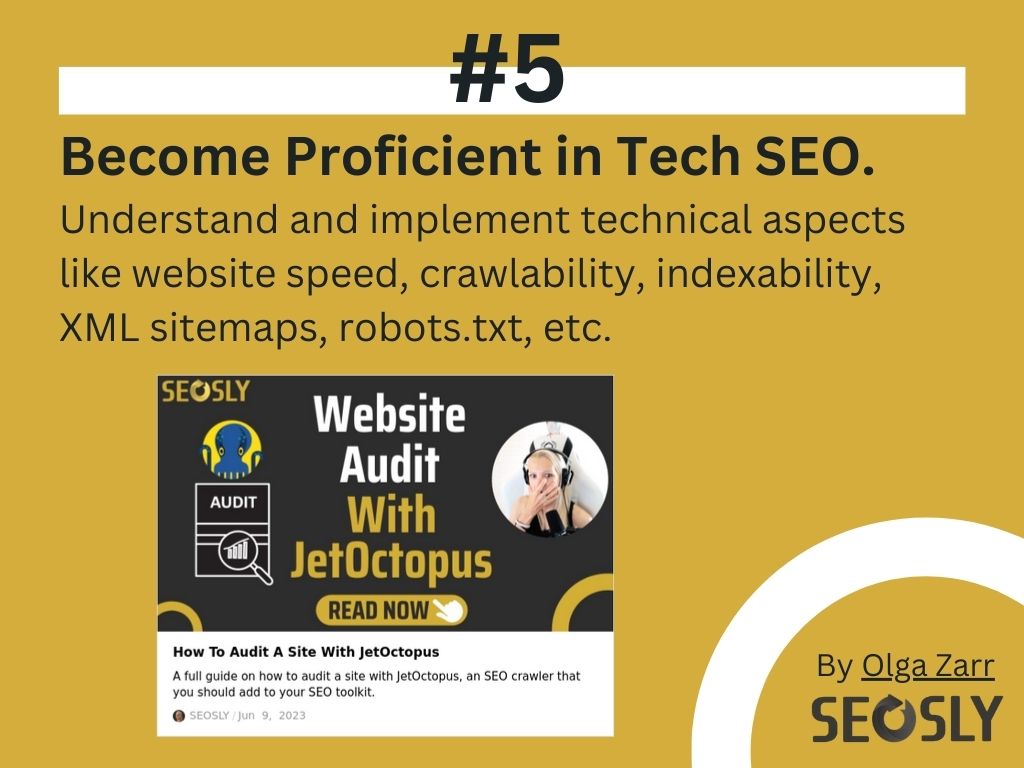
Master technical website elements that impact indexation and crawl ability like robots.txt, XML sitemaps, structured data markup, canonical tags, hreflang tags, page speed, responsive design, broken link checking, etc. Monitor for manual actions. Technical optimization creates critical site accessibility and discoverability.
SEO Expert Tip #6: SEO Auditing
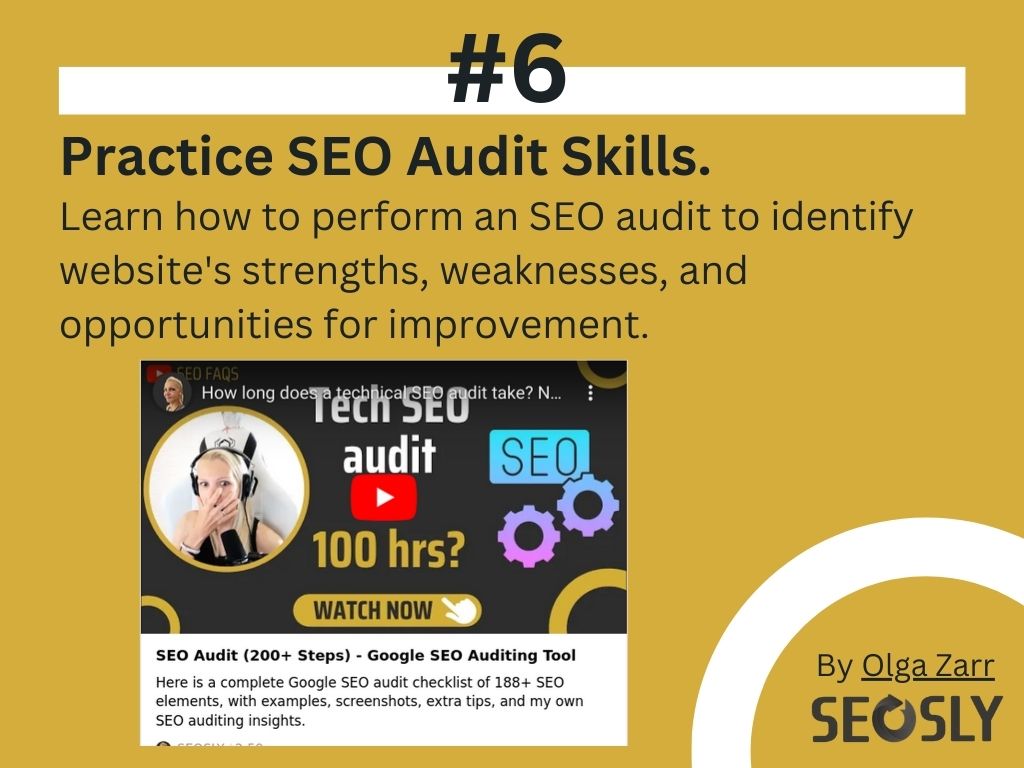
Learn how to conduct detailed manual audits of sites assessing elements like keywords targeted, on-page optimization, site architecture, technical health, backlinks and competitions comparison. Develop skill at evaluating and identifying issues that are impacting site visibility, traffic and conversions. Maintain comprehensive SEO audit checklists.
SEO Expert Tip #7: HTML and CSS
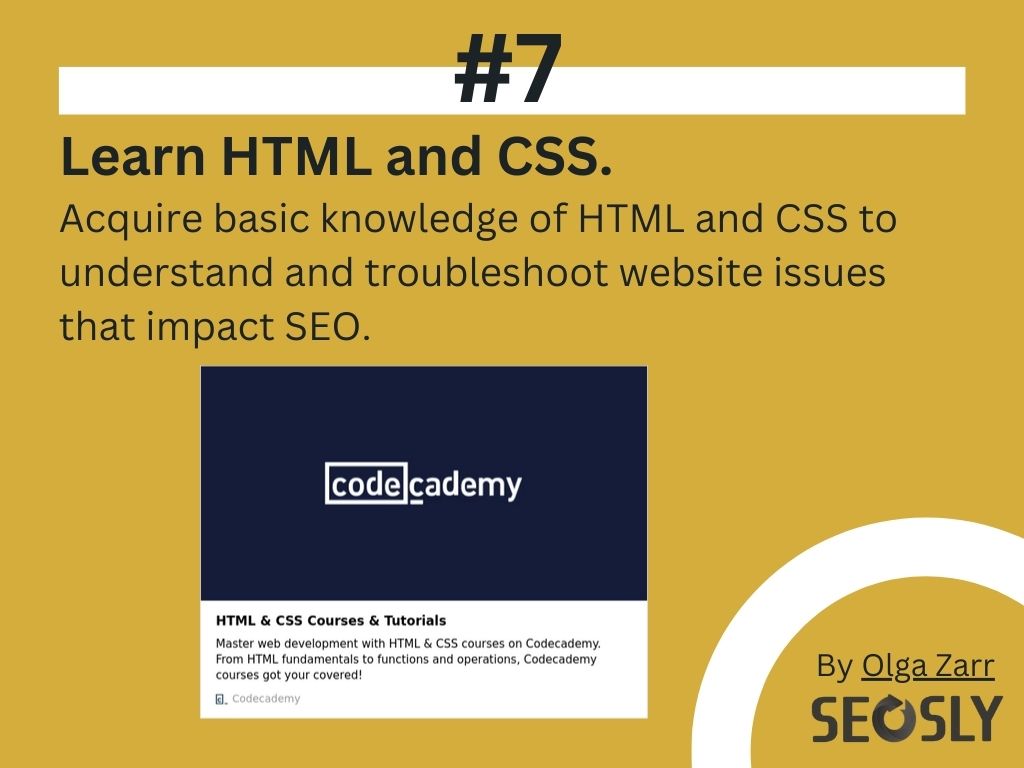
Learn HTML basics like tags, attributes, elements and structures for text formating and linking. Understand CSS for presentation layer including selectors, borders, padding, colors and layouts. This allows better collaboration with development teams on execution of recommendations.
SEO Expert Tip #8: Measuring SEO Success
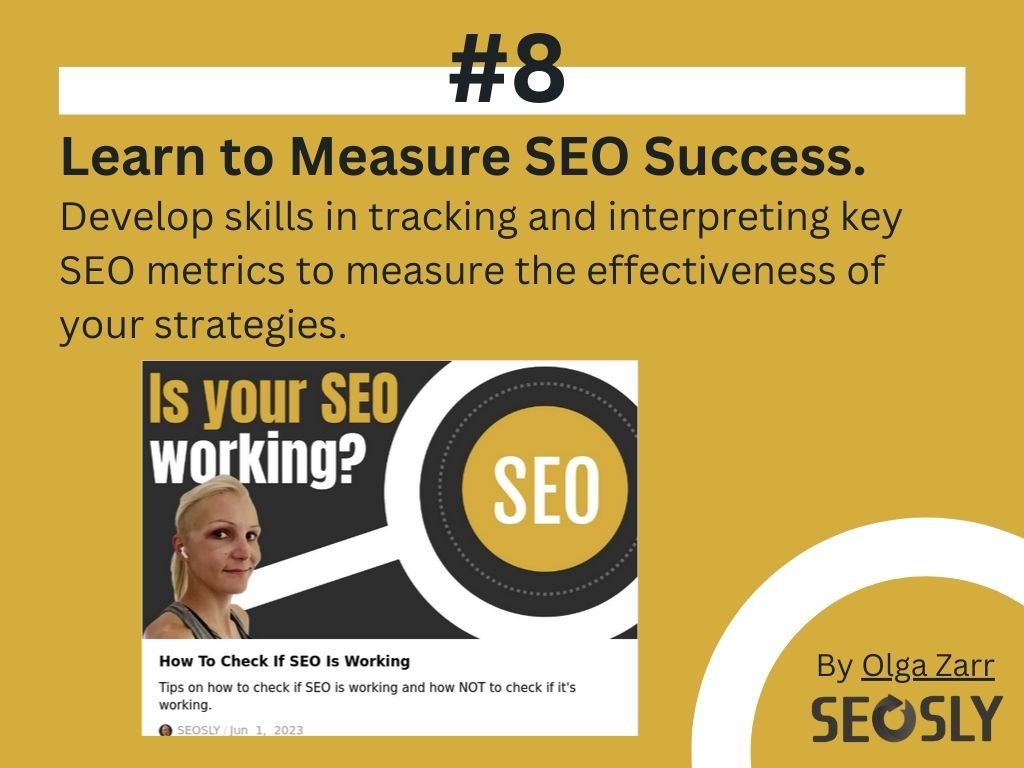
Identify and regularly track key SEO metrics like rankings for target keywords, organic traffic growth, bounce rates, pages per session and goal conversions. Compare to past performance. Monitor changes after optimizations go live. Measure holistically against business KPIs, not vanity metrics.
SEO Expert Tip #9: SEO Certifications
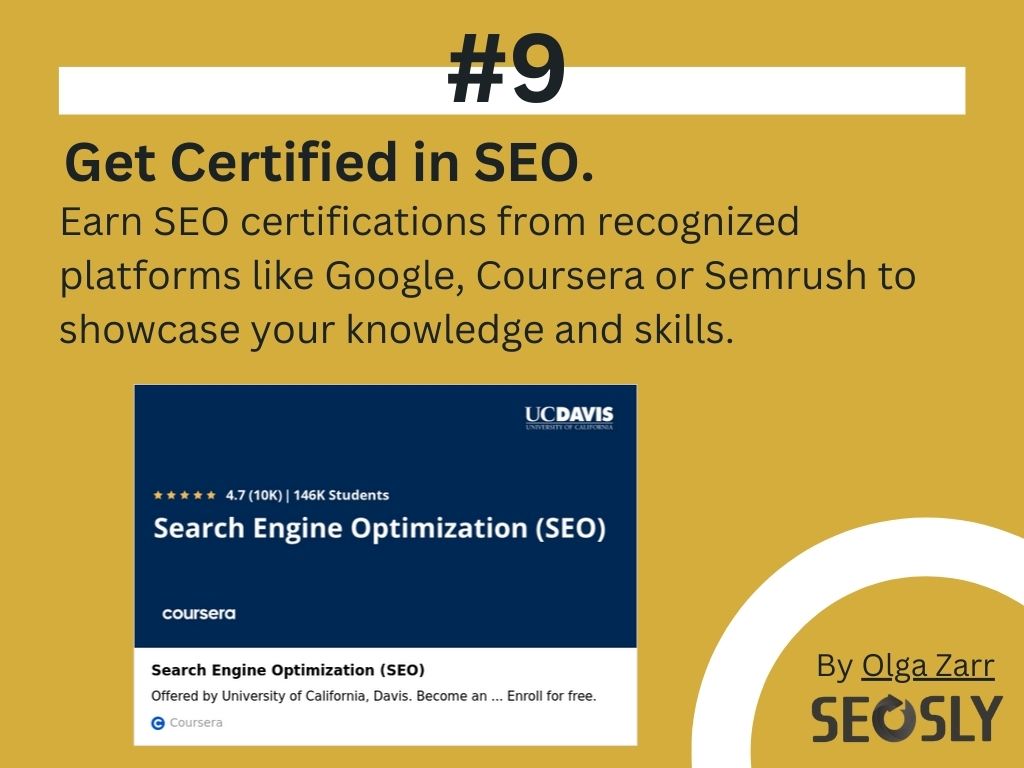
Complete accredited SEO courses, specializations and certifications to cement theoretical and practical knowledge. Some well recognized programs are offered by Moz, HubSpot and University of California Davis. Certifications enhance expertise.
SEO Expert Tip #10: SEO Tools
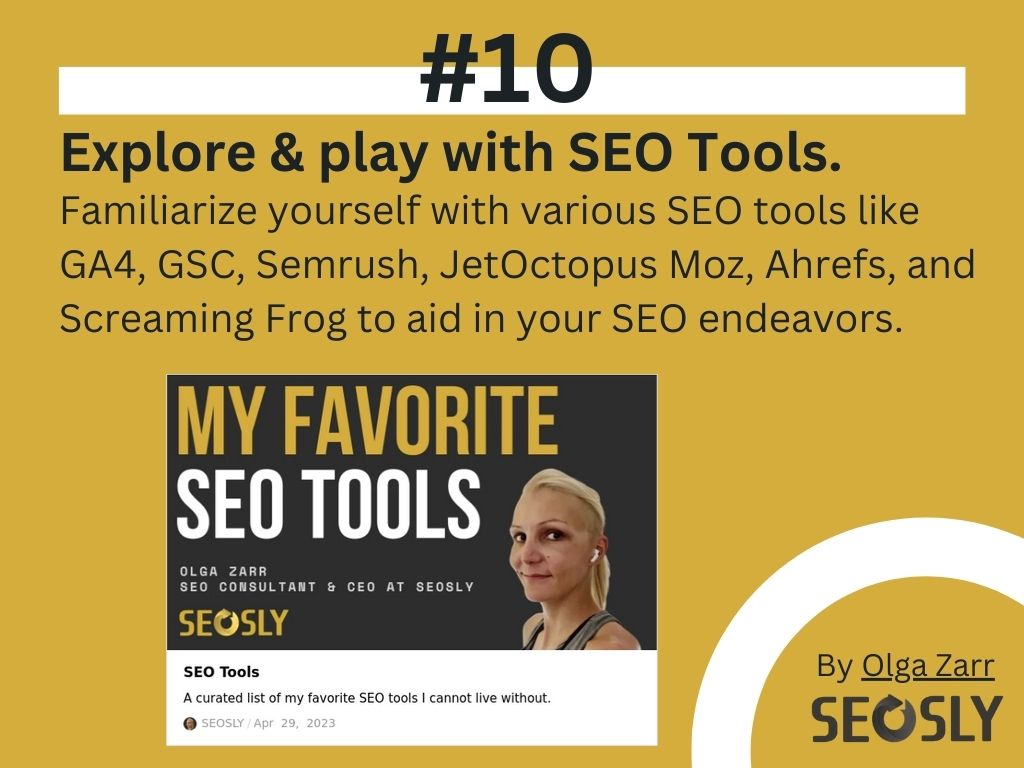
Develop competence leveraging leading SEO tools such as Ahrefs, Moz, Semrush, Screaming Frog, JetOctopus and others for activities like keyword research, backlink analysis, site audits, rank tracking and data reporting. Using the right tools for each task drives productivity.
SEO Expert Tip #11: Google Algorithm Changes
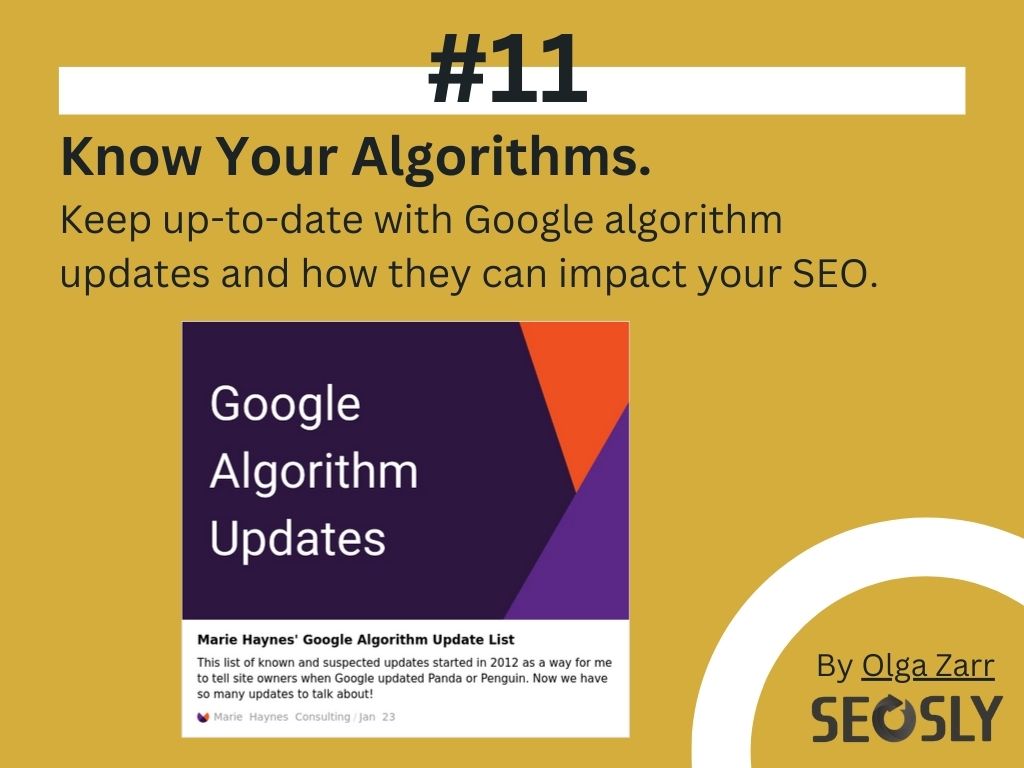
Closely track Google algorithm updates like core updates and product reviews updates that reshape how pages rank in SERPs. Understand common factors affected by algorithms like page experience, E-E-A-T, content depth, etc. Monitor sites for positive and negative ranking impacts. Stay on top of algorithm news through trusted industry resources.
SEO Expert Tip #12: Networking
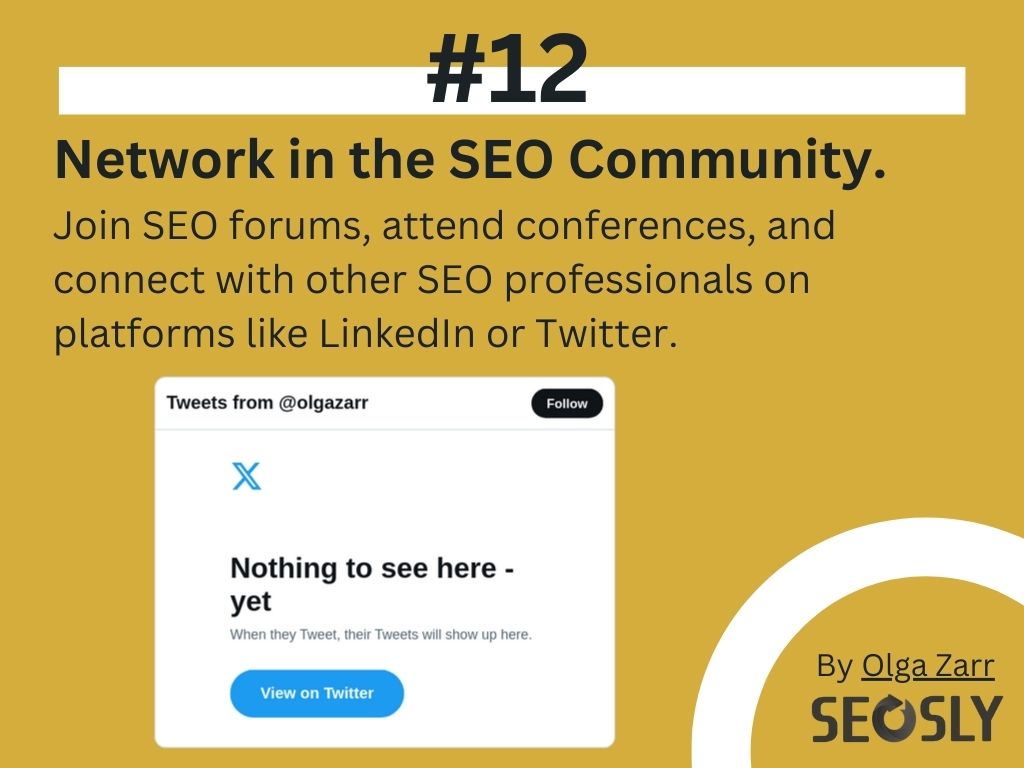
Actively connect with other SEO professionals via forums, groups, conferences and social channels. Develop trusted relationships to exchange insights on algorithm changes, emerging tactics and innovations. Brainstorm challenges. Stay updated on the latest best practices by learning from peers. Attend key events.
SEO Expert Tip #13: Local SEO
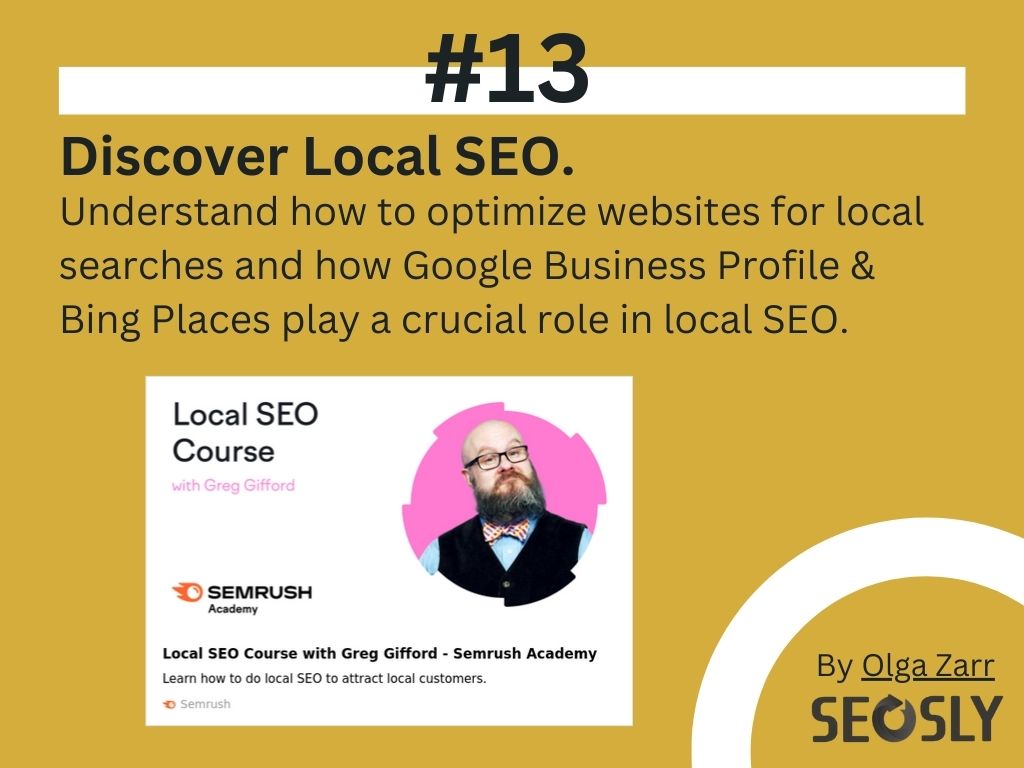
Master elements involved in local SEO like Google Business Profile optimization, localized content, managing online reviews and citations, local link building and implementing schema markup for business info, opening hours, location etc. Understand the impact on local pack rankings and organic visibility.
SEO Expert Tip #14: Daily SEO Practice
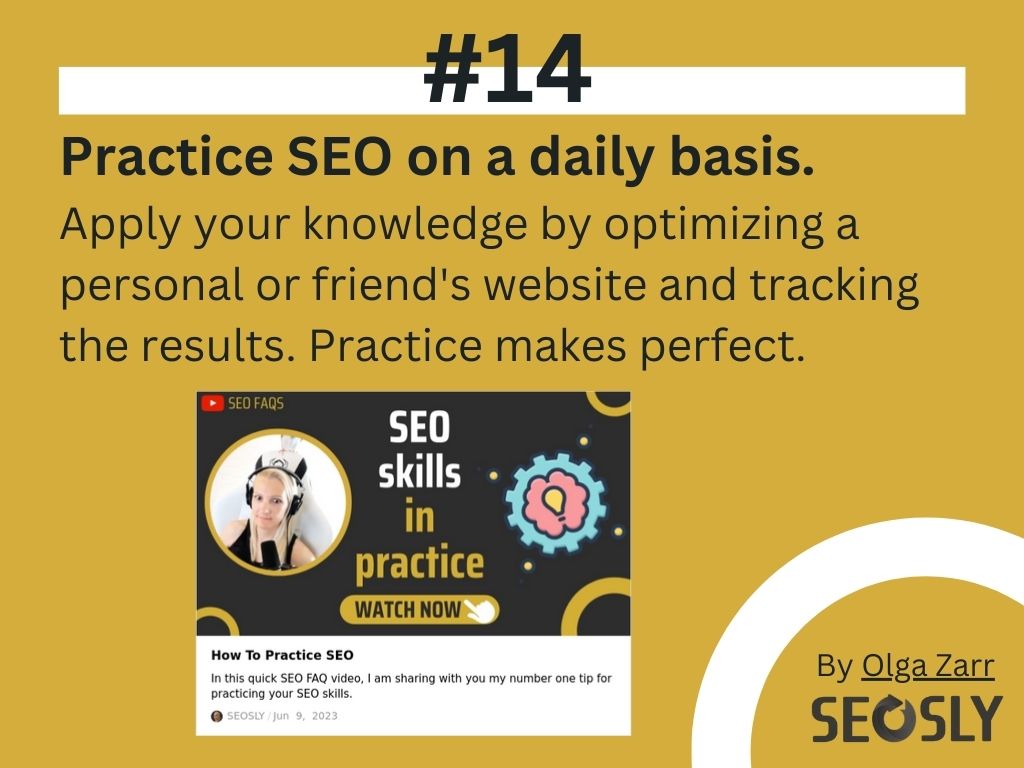
Continuously optimize pages for target keywords, refresh content, improve technical site health factors, build additional links and publish new pages. Run regular experiments testing new variables like content lengths, images used, etc. and measure effects. Practice daily for sustainted improvements.
SEO Expert Tip #15: Follow SEO Thought Leaders
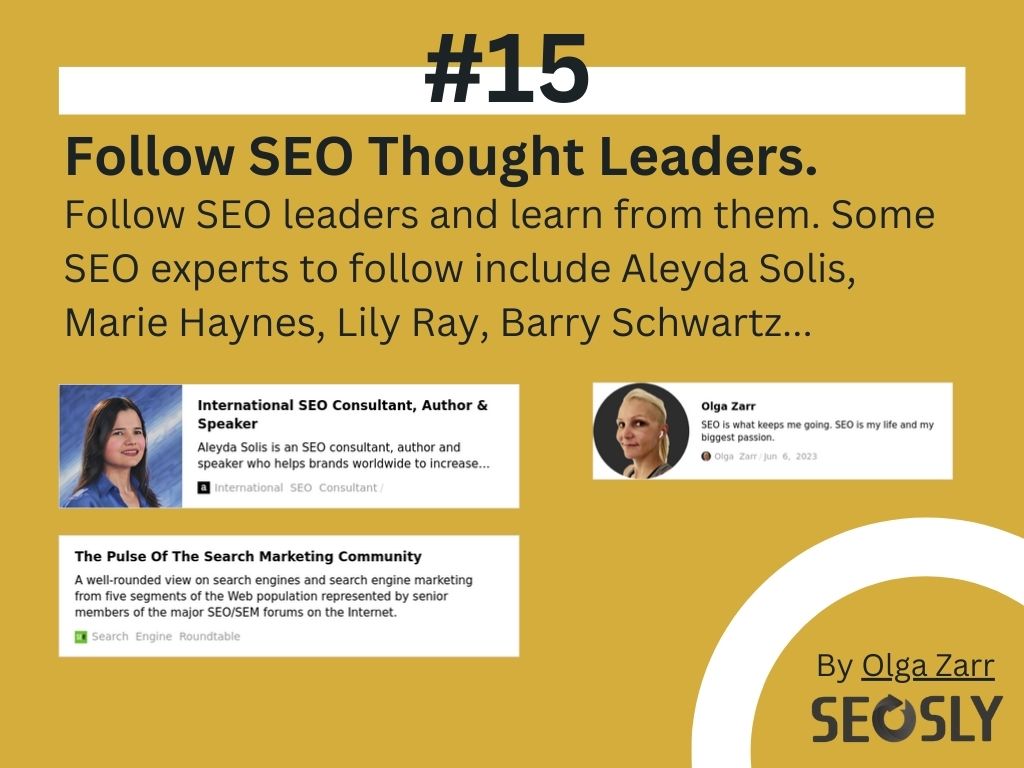
Follow prolific bloggers, podcasters, community figures and conference speakers who shape SEO best practices and offer tricks of the trade. Monitor their articles, podcasts, videos and presentations. Some top names are Aleyda Solis, Marie Haynes, Barry Schwartz and Glenn Gabe.
SEO Expert Tip #16: SEO Communities
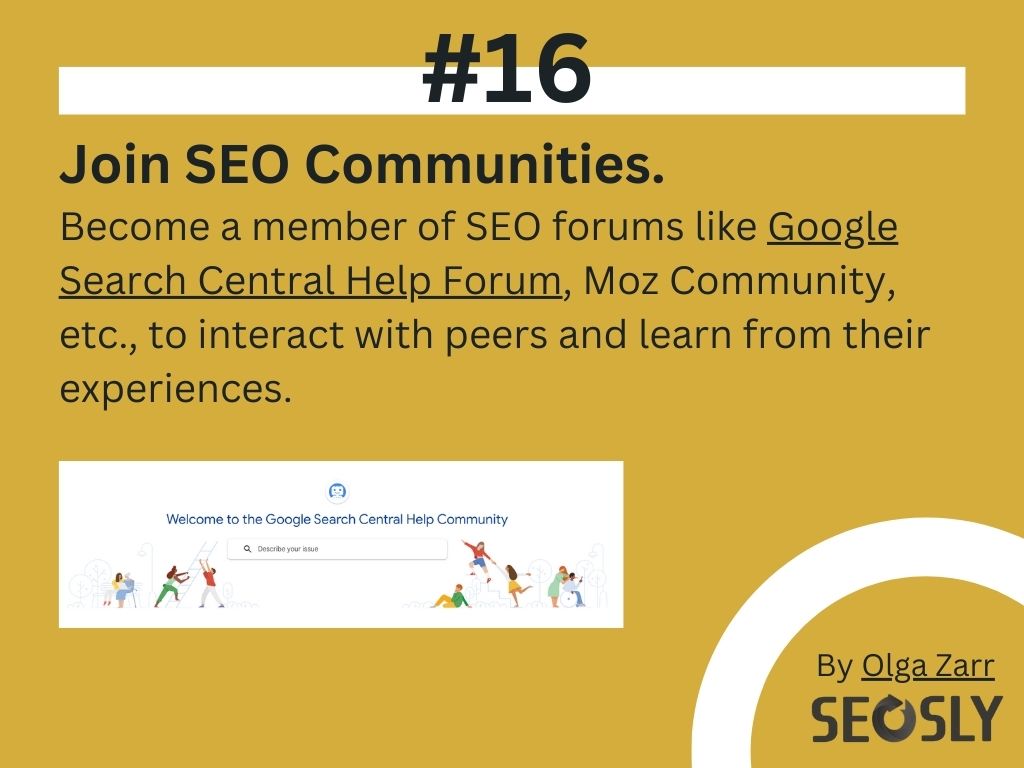
Signup for forums like WebmasterWorld, Black Hat World and Reddit SEO subs to participate in strategy discussions. Join Facebook SEO groups and LinkedIn networking groups to tap into collective knowledge. Develop connections. Of course, you cannot miss the Google Help Forums.
SEO Expert Tip #17: Data Analysis for SEO
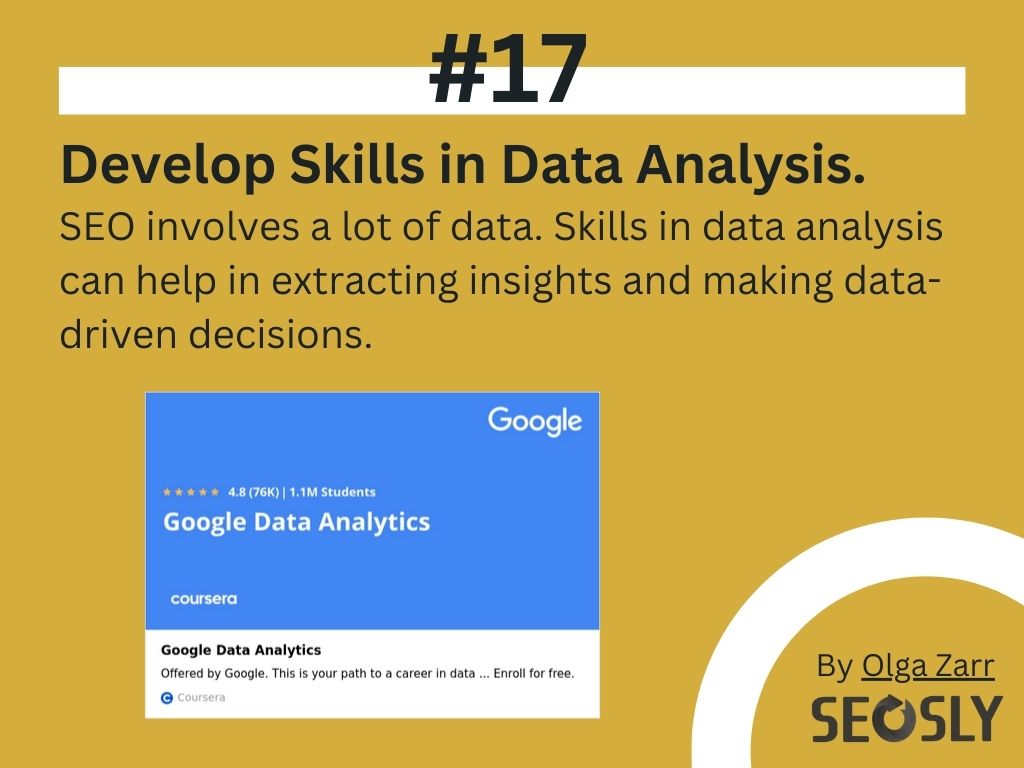
Become competent pulling data from Google Analytics, Search Console, Rank Tracking software and crawling tools. Analyze using Excel, Data Studio etc. to extract insights around traffic channels, popular pages and posts, conversions and KPIs. Discover optimization opportunities.
SEO Expert Tip #18: Continuous Learning
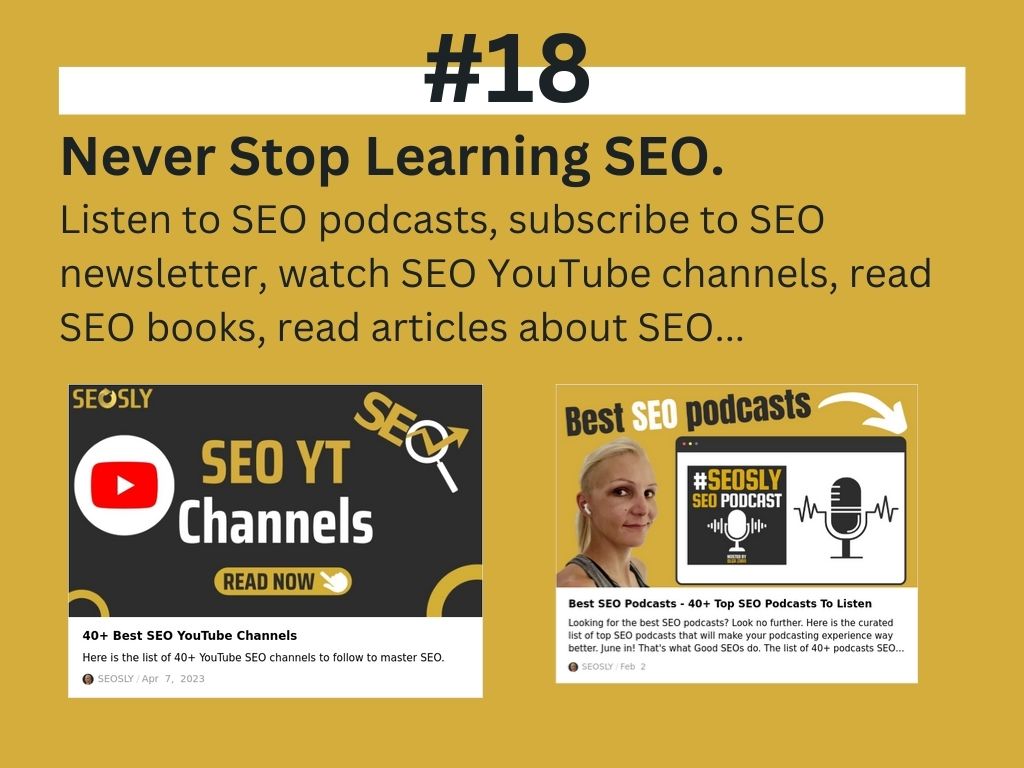
Constantly expand expertise given the dynamic SEO landscape. Leverage free resources like Moz Blog, SEJ, Search Engine Roundtable, Search Engine Land, SEOSLY Blog along with paid training platforms. Listen to podcasts from leaders during commutes. Commit to ongoing knowledge expansion.
SEO Expert Tip #19: Build A Portfolio
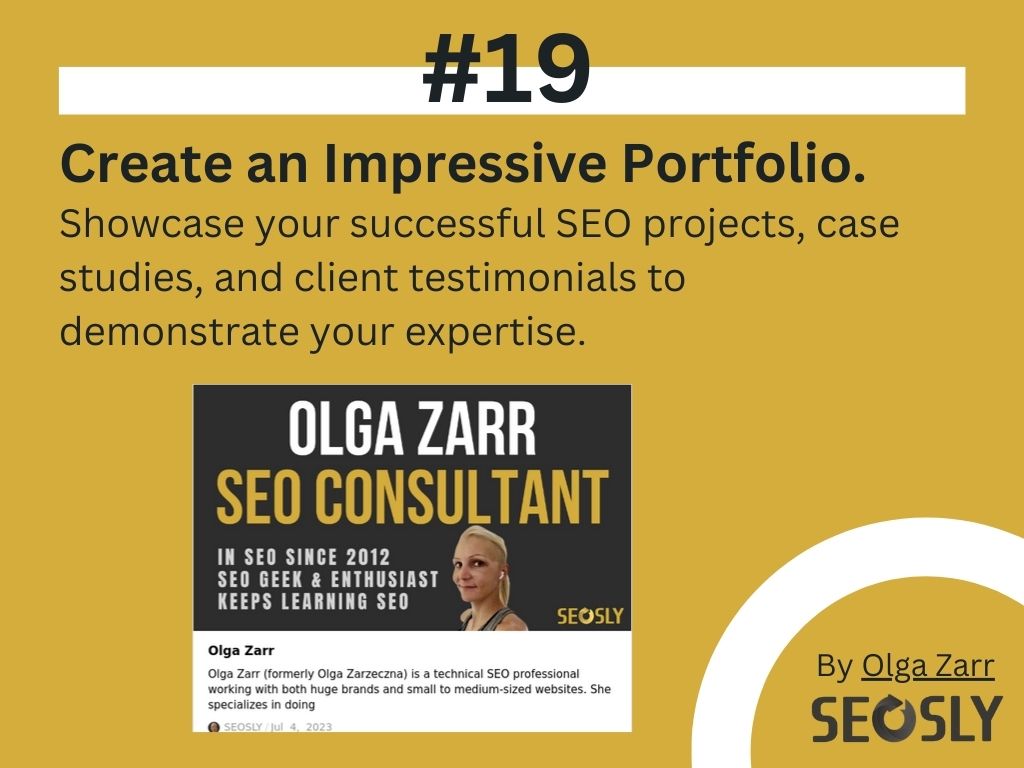
Showcase SEO consulting achievements across clients highlighting successes via case studies. Demonstrate wins in driving more organic traffic, rankings improvement, lead generation etc. backlinked to data. Highlight certifications obtained. Display technically precise expertise.
SEO Expert Tip #20: Programming Knowledge
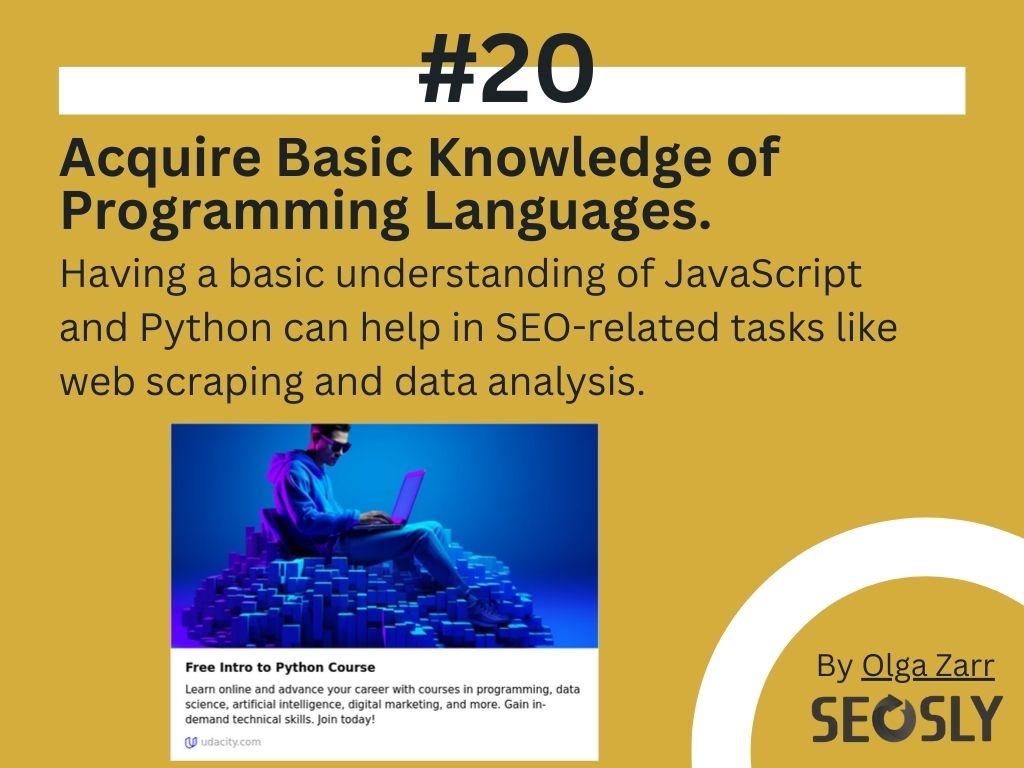
Gain foundational understanding of HTML to structure website content properly and CSS to control presentation and layout. Additionally, learn basics of Python including variables, data types, functions and logic for automating tasks. This enables smoother collaboration with technical SEO team members.
SEO Expert Tip #21: Google Search Console
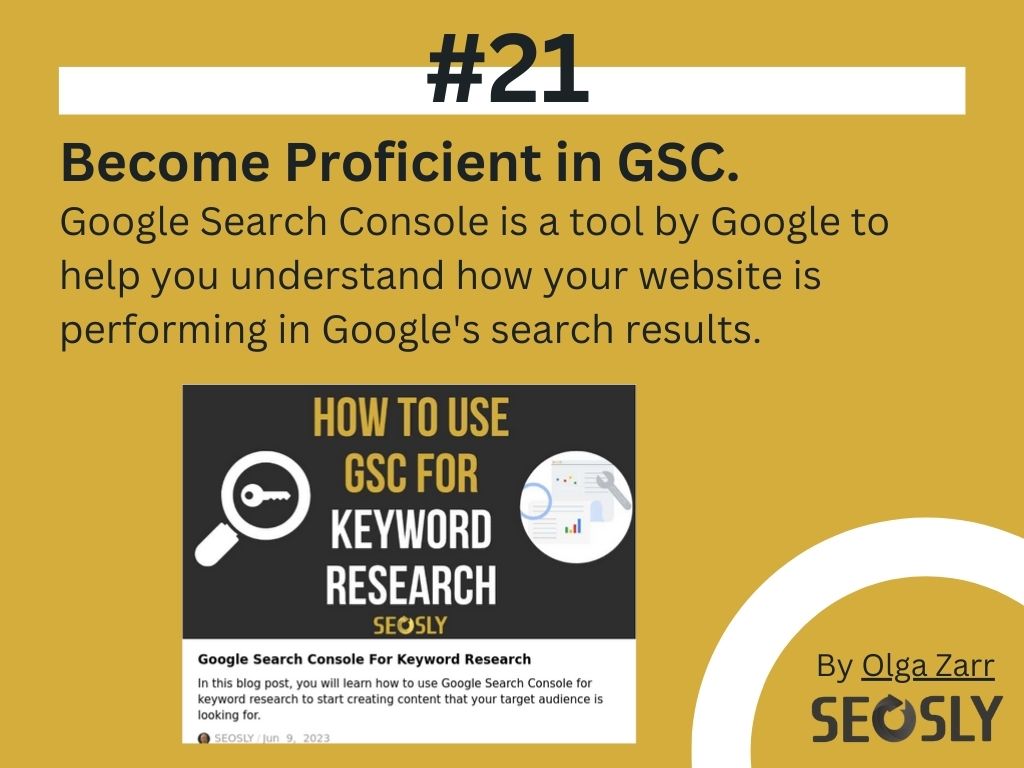
Master usage of Google Search Console platform including reviewing crawl errors, manual actions and optimization opportunities. Analyze user search query data for insights into website content gaps. Fix technical issues surfaced. Integrate with other analytics platforms. Refer to it daily optimizing sites.
SEO Expert Tip #22: Communication Skills
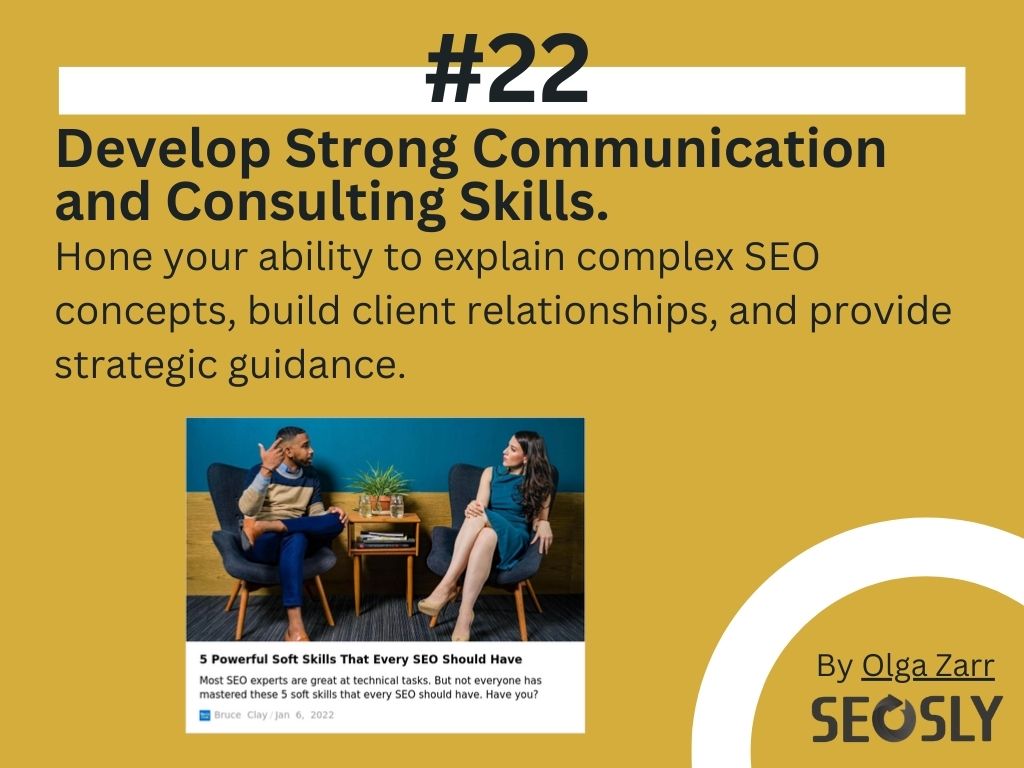
Develop strong consulting skills to explain technical SEO topics clearly to clients without using industry jargon. Address client concerns about recommendations calmly and confidently while highlighting upside. Write compelling reports on optimization progress. Continuous improvement of client communication abilities is key.
SEO Expert Tip #23: Content Marketing
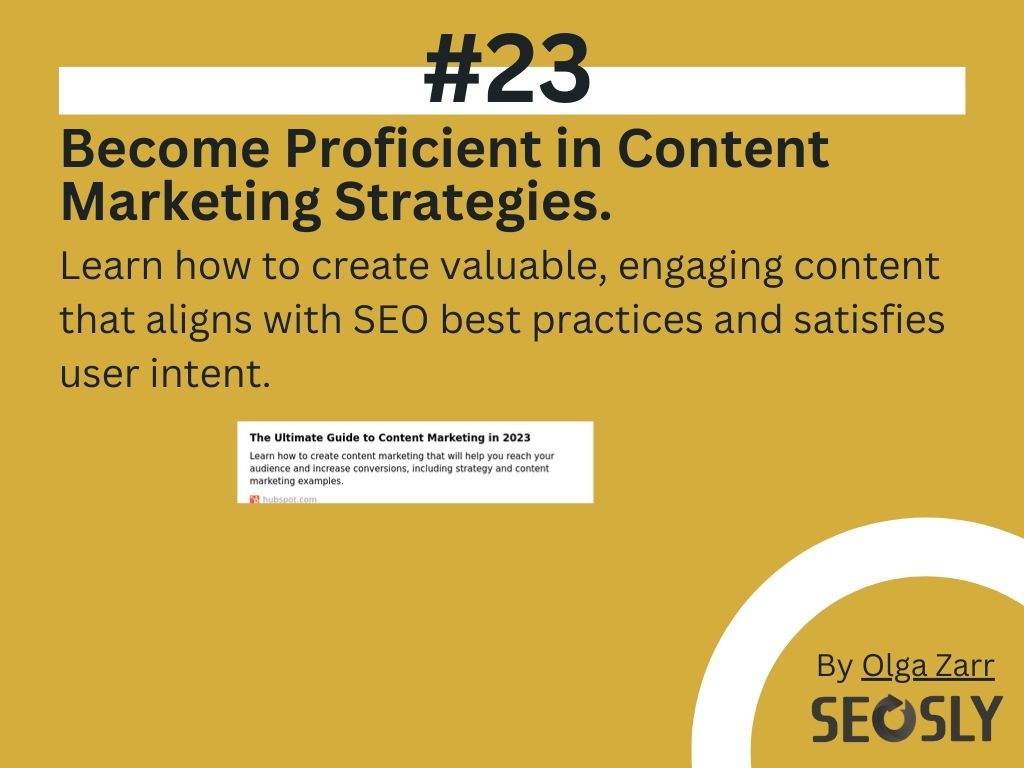
Incorporate proven content marketing best practices into SEO strategies including creating topic clusters, pillar pages, resource hubs and regularly updating existing content. Produce optimized, high-quality content that attracts and engages search visitors to maximize traffic, leads and conversions.
SEO Expert Tip #24: Schema
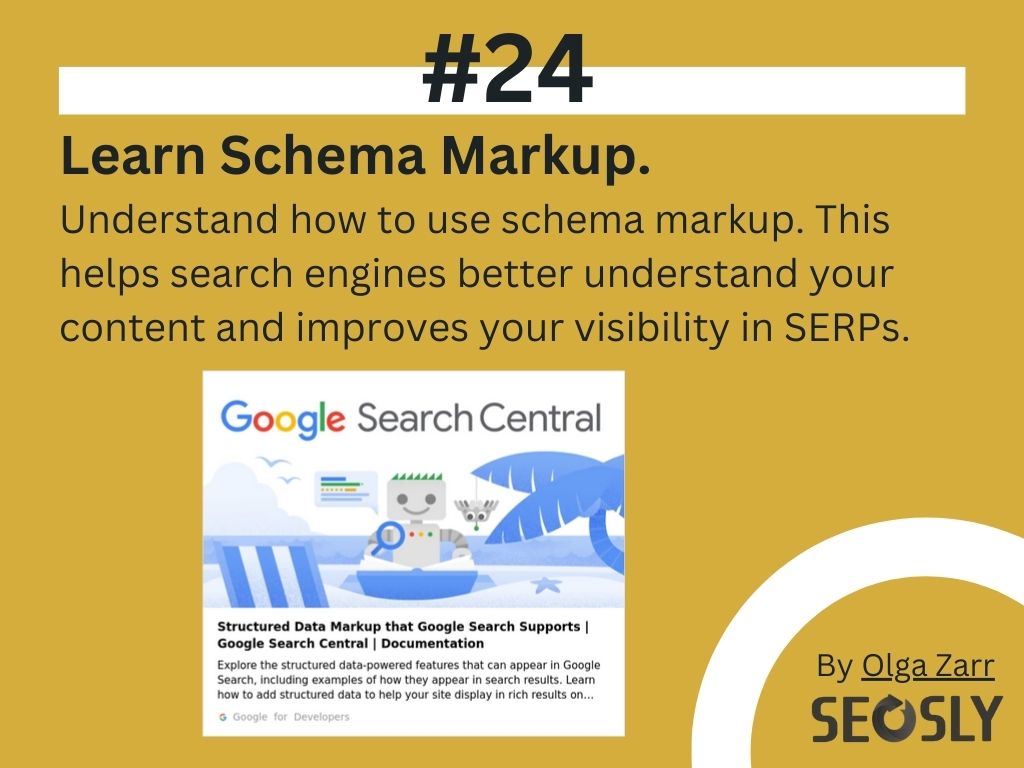
Implement JSON-LD structured data schema markup that enhances search visibility through rich results, better aggregation and comprehension of site content. Test effectiveness of different schema for featured snippets, FAQs, ratings etc. Continually refine implementation for better exposure.
SEO Expert Tip #25: AI and SEO
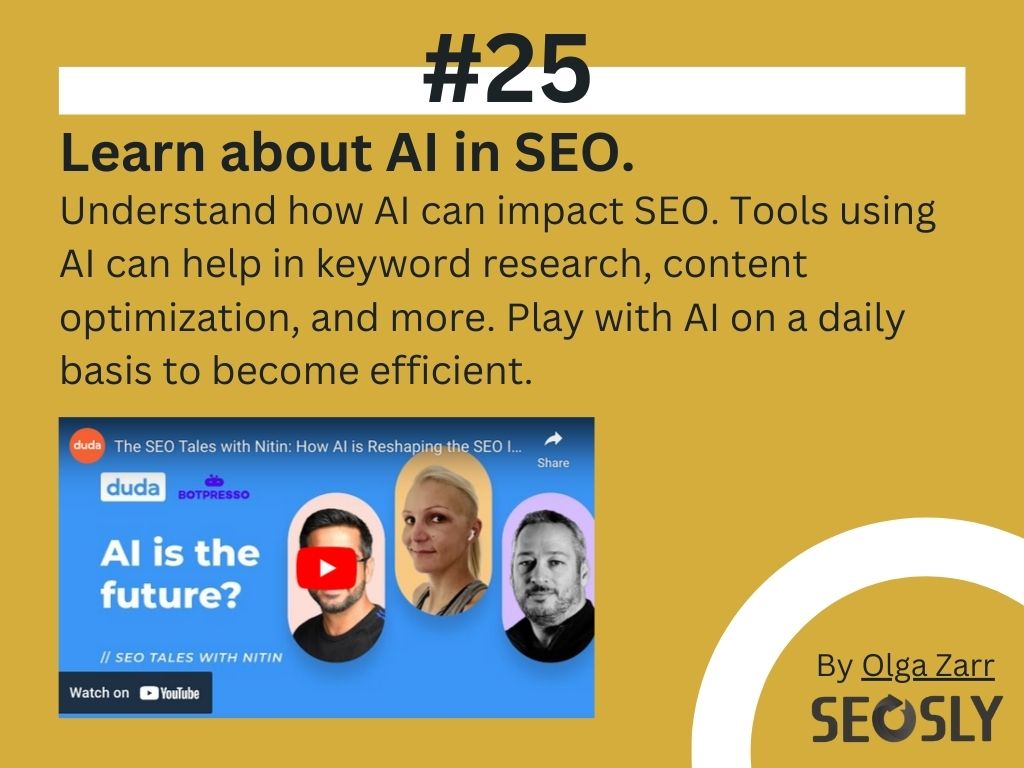
Closely track the evolution of search toward AI-based results. Understand how to create content optimized for comprehension by large language ******. Appropriately leverage AI tools for content creation, keyword ideas and competitive analysis to boost productivity.
SEO Expert Tip #26: SEO Project Management
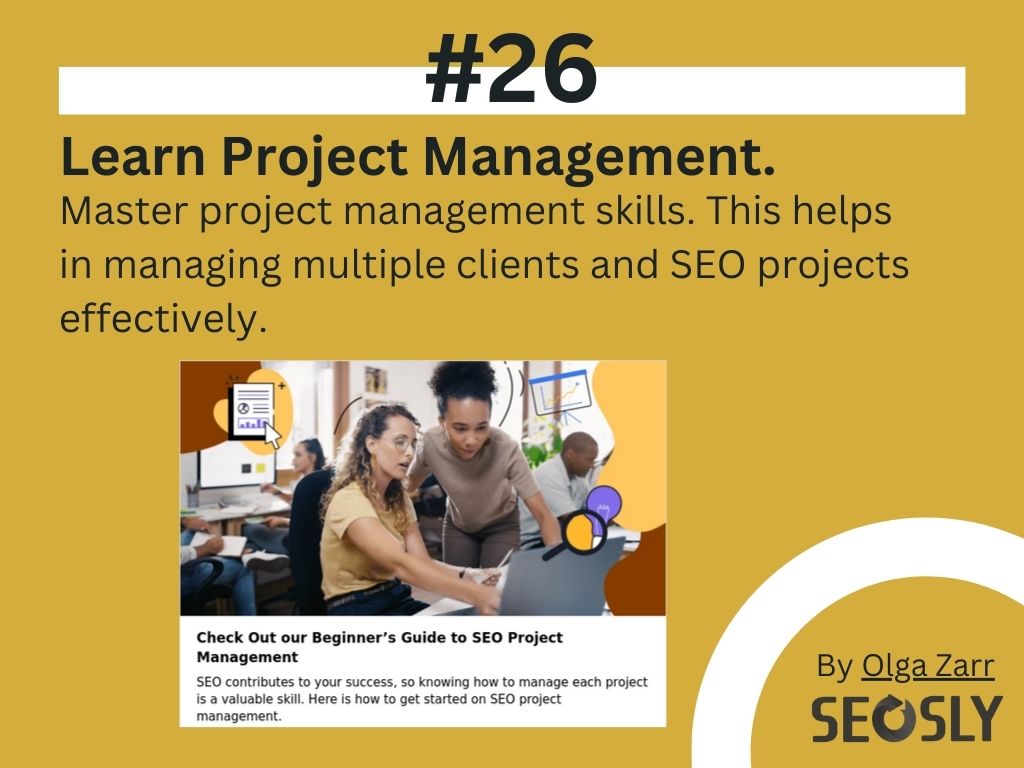
Use project management systems like Asana, Trello or Jira to organize tasks across clients, assign due dates and set reminders for key deliverables. Track progress across current website optimization projects so nothing falls through cracks enabling consistent client results.
SEO Expert Tip #27: SEO Reporting
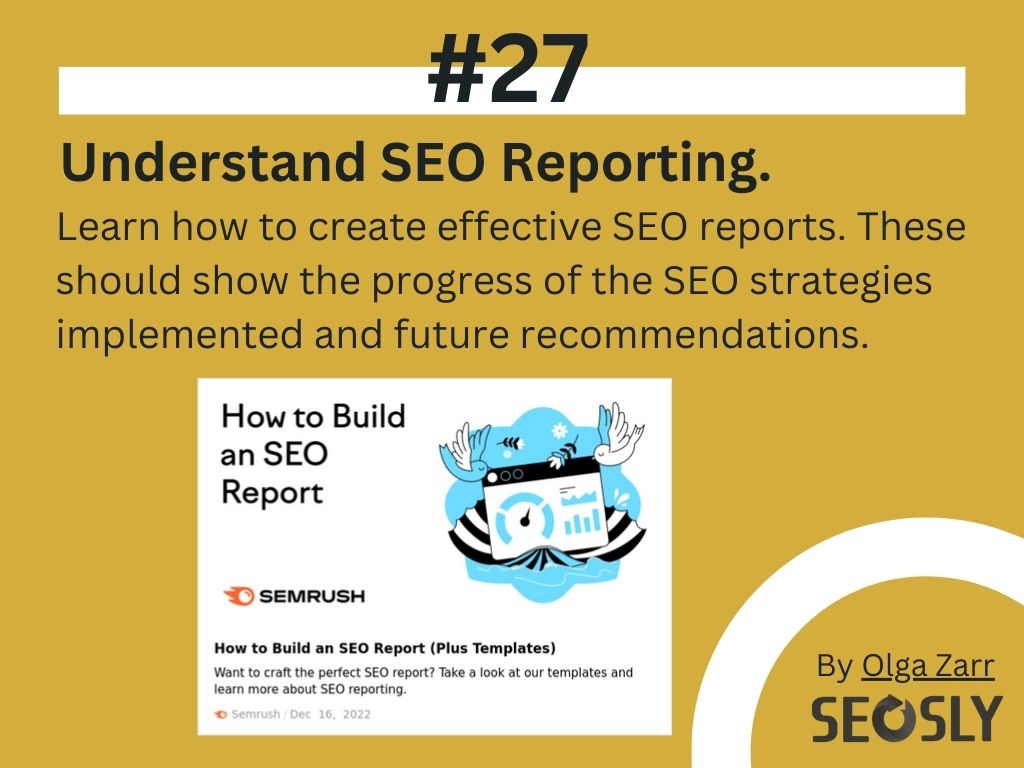
Design visually compelling reports for clients using Data Studio or Looker Studio quantifying rankings progression, search traffic growth, lead generation and conversions month-over-month. Benchmark against competitors. Include insights into top landing pages and most impactful efforts fueling gains.
SEO Expert Tip #28: Specializing in a Niche

Develop deep expertise in a specific SEO niche such as ecommerce SEO, local service SEO or Google Ads + SEO to stand out from generalist consultants. This could also entail specialization in a topical industry like legal, healthcare or financial services marketing.
SEO Expert Tip #29: Pitching
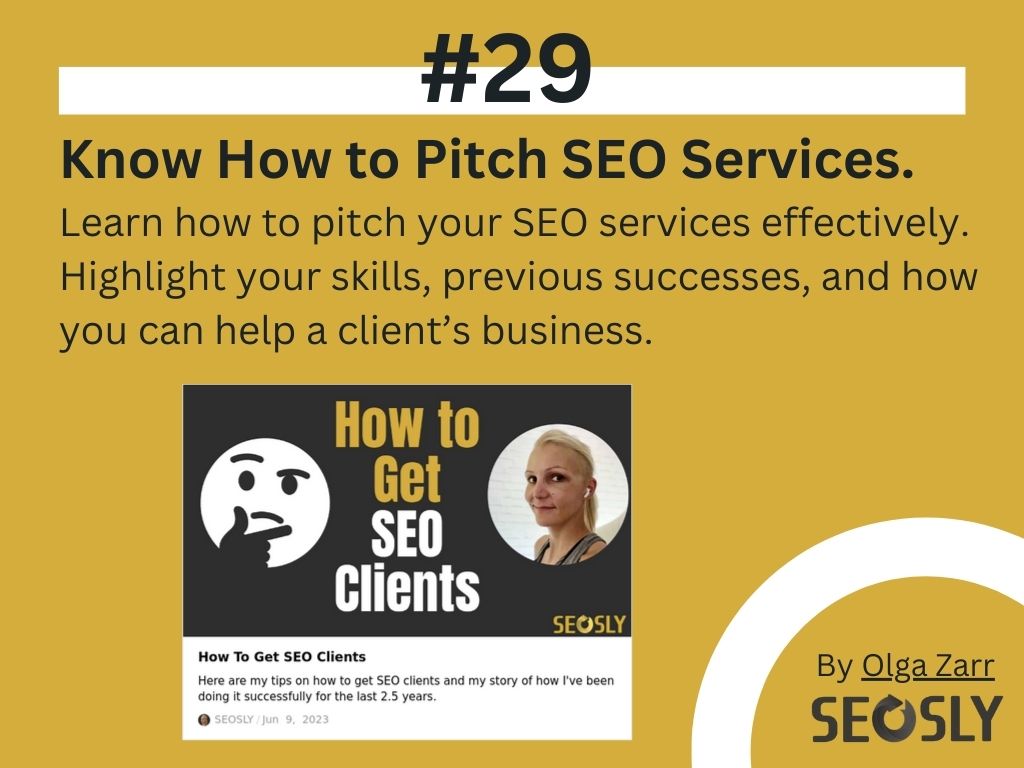
Craft engaging proposals explaining the SEO approach, quantifying potential upside for the prospect website through benchmarks. Convey unique expertise in niche areas and include case study results demonstrating ability to deliver outcomes. Perfect consultation and sales skills.
SEO Expert Tip #30: CRO
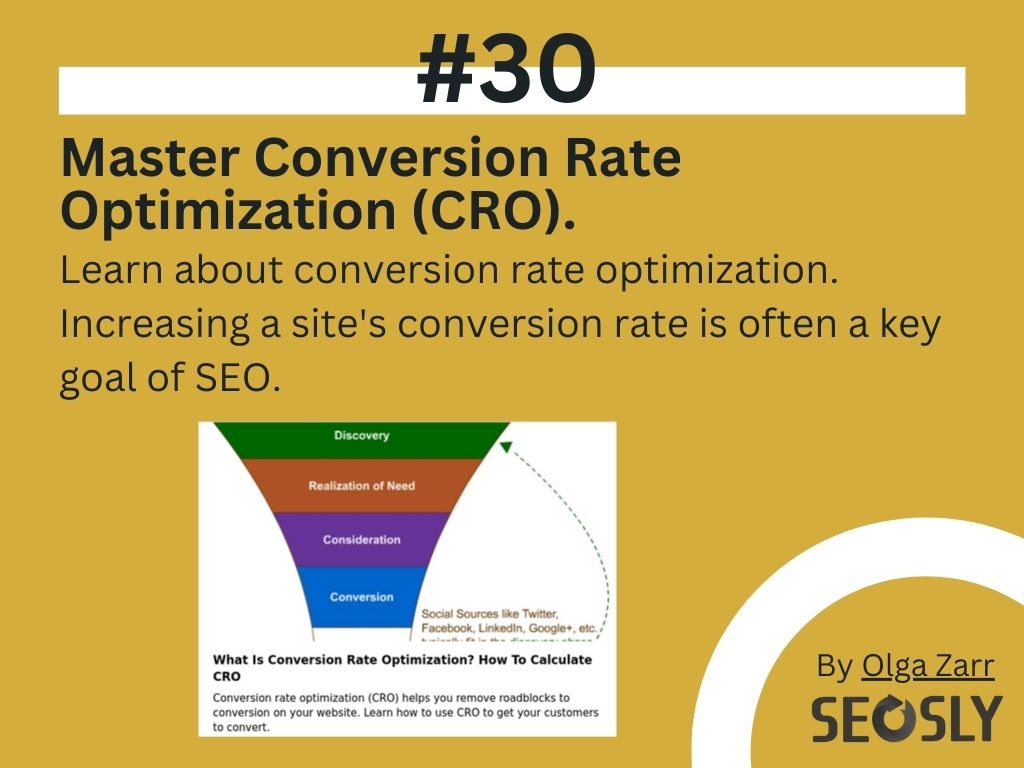
Optimize on-site elements using testing tools to increase conversion rates from SEO traffic. This includes simplifying navigation paths, improving page load speeds, refining content clarity, enhancing call-to-action placement and adjustments to forms or checkout flows. Significant business impact possible.
SEO Expert Tip #31: Your SEO Consultancy
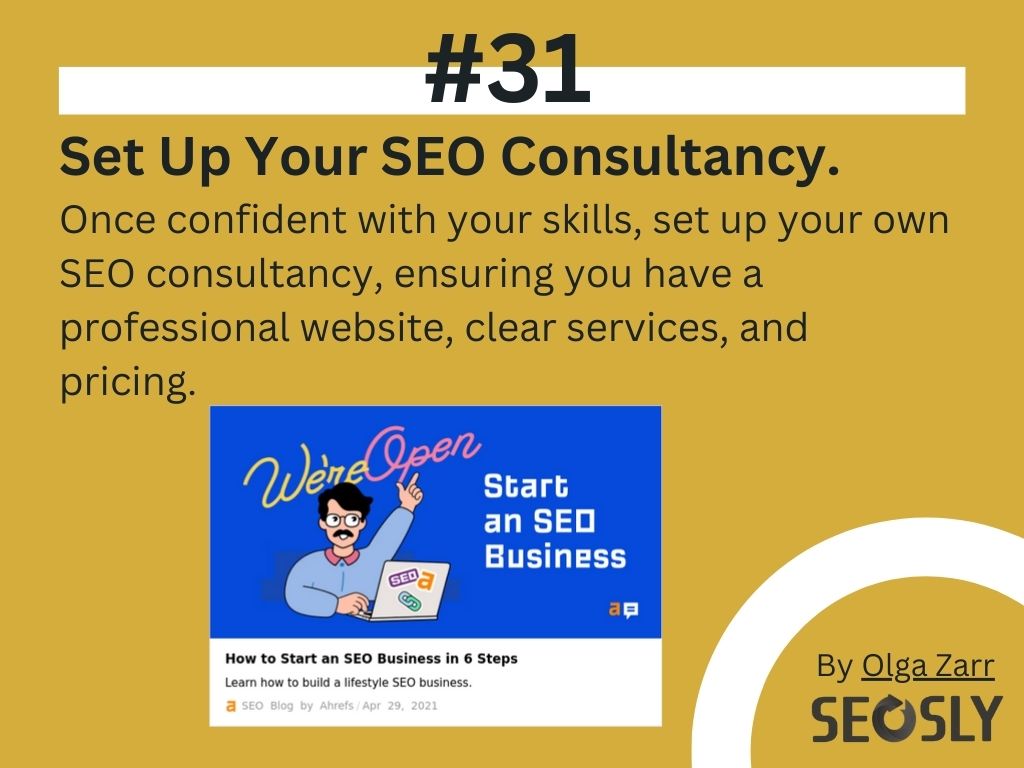
Establish an independent consultancy entity to have full control over service offerings, niche specialties, clientele focus and pricing ****** without relying on others for work. Requires business operational expertise but provides freedom and scalability upside.
FAQs (Frequently Asked Questions) on how to become an SEO expert
Here are some of the most often asked questions about becoming an SEO expert.
What are the first steps to becoming an SEO expert?
The first steps to becoming an SEO expert are thoroughly learning SEO fundamentals like how search engines operate, on-page and off-page ranking factors, keyword research, and technical website optimization. Creating your own websites allows hands-on experimentation with different optimization techniques to determine what works best for rankings and traffic. This practical experience accelerates expertise.
How does creating your own website contribute to becoming an SEO expert?
Creating your own websites contributes invaluable first-hand SEO experience determining effective tactics through optimization tests and result measurements. The hands-on application opportunity offers accelerated practical learning beyond courses alone. Tracking actual website outcomes provides optimization insights.
What role does mastering keyword research play in becoming an SEO expert?
Mastering keyword research is foundational because targeting searches with sufficient volume and competitiveness leads to rankings wins and user visibility. SEO experts fluently identify and analyze keyword opportunities using tools to inform content and website optimization targeting. The best keywords balance search demand and difficulty.
Why is on-page SEO critical for an SEO expert?
On-page SEO is critical as search engines heavily weigh relevancy signals from page content and structure to determine what the page focuses on topically. Optimizing elements like titles, headers and body content facilitates search engine comprehension of page relevance for serving users.
How does understanding technical SEO contribute to your expertise as an SEO expert?
Understanding technical SEO allows properly structuring websites for crawling, indexing and accessibility. Technical shortcomings like site architecture or structured data errors can prevent pages from ranking regardless of content quality. Technical mastery enables visibility.
What is the importance of conducting SEO audits for an SEO expert?
Conducting detailed SEO audits quickly uncovers obstacles impacting performance across elements like keywords, content, backlinks and site speed. Auditing skills allow experts to strategize improvements and monitor website health continually. It impresses clients.
Why is continuous learning important for an SEO expert?
Continuous SEO learning is vital because search engine algorithms and SERP features constantly evolve, necessitating expertise adaptation. Regular knowledge expansion through blogs, courses and podcasts keeps strategies aligned to ranking factors. Stagnating understanding risks dated tactics.
How can an aspiring SEO expert stay updated with algorithm changes?
Aspiring experts stay updated on Google algorithm changes by closely tracking high-authority industry resources. Algorithm shifts influence ranking factors and can uplift or demote websites, so monitoring changes allows properly advising clients afterward.
How do networking and community involvement benefit an aspiring SEO expert?
Networking allows exchanging SEO insights with industry peers while community involvement through forums and groups enables helping others fix issues. Both build connections and awareness of emerging tactics and innovations. Surrounding yourself with experts provides motivation.
Why is it important for an SEO expert to have a deep understanding of HTML and CSS?
Understanding HTML structure and CSS presentation facilitates better collaborating with technical SEO personnel executing page content and design recommendations. The comprehension allows conveying changes more precisely. Complete coding skills are unnecessary though.
What metrics should an SEO expert focus on when measuring SEO success?
SEO experts focus on increased organic traffic, conversions, leads and revenue as key indicators of SEO success rather than vanity metrics like keyword positions. Business and growth KPIs captured in tools like Google Analytics quantify the technical work’s bottom-line impact.
How can specializing in a niche benefit an SEO expert?
Specializing in a niche SEO area like local SEO or ecommerce builds uniquely deep expertise that attracts ideal clients specifically needing those specialized optimization services. The targeting increases perceived authority in closely defined areas.
What steps should one take to start their career as an SEO expert?
Recommended steps to start an SEO career include learning SEO fundamentals, creating websites to gain hands-on skills, strengthening abilities through certifications, networking with experts, tracking algorithm updates and continually optimizing pages and expanding SEO knowledge.
Why is practical experience with SEO tools crucial for an SEO expert?
Practical experience using leading SEO tools for activities like keyword research, backlink analysis, technical site audits and rank tracking builds efficiency. Tool familiarity saves research time and provides optimization insights through data.



